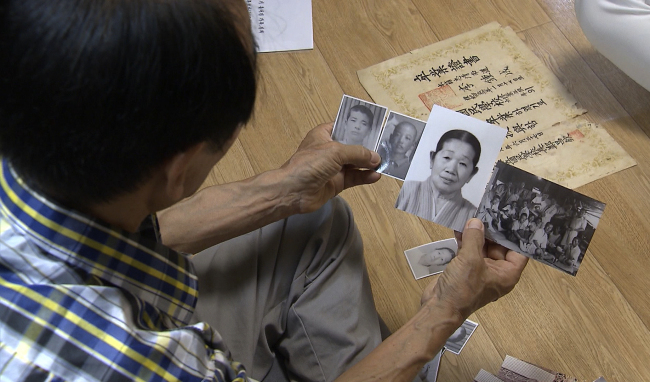For Chung Hak-soon, it feels just like yesterday when she recalls the days she was together with her brother before they were separated by the 1950-53 Korean War.
It must have been a lifetime dream for the 81-year-old woman to meet her brother in North Korea again. But it is too late to realize it as the sibling she loved already passed away years ago.
One consolation is that she is to meet the family of her late brother for the first time in the upcoming family reunion event to be held this week.
"I really wished to see even the face of my brother, but the reunion has come too late," Chung lamented.
Chung is one of 89 South Koreans chosen to take part in the family reunion event to be held from Monday to next Sunday at a Mount Kumgang resort on the North's east coast.
 |
In this file photo dated Aug. 15, 77-year-old Lee Soo-nam holds up photos of his family left in North Korea. He is one of 89 South Koreans chosen to take part in the family reunion event at a Mount Kumgang resort on the North's east coast. (Yonhap) |
The reunion is a rare occasion for those who had sought in vain for decades to see their families in the North.
This week's event is the first of its kind since October 2015.
The two Koreas have held just 20 rounds of face-to-face family reunions since the first-ever inter-Korean summit in 2000.
The 90 people fortunately chosen to join this week's event represent just a small fraction of about 57,000 people waiting to meet their loved ones in the North again.
The problem is that many of them are in their 70s or older, meaning the window of opportunity is fast closing down for their dreams to meet their parents, brothers and sisters again before they die.
In the months leading up to this week's event, many had to give up those hopes and instead be satisfied to see relatives who they have not seen before.
Park Hong-seo is one of them.
The 88-year-old wanted to see his older brother again when he applied for the family reunion. He was later informed that his brother already passed way in the mid-1970s.
The brother, who was running a hospital in Wonsan, could not join the rest of his family when they moved south in 1946 to avoid the rule of communists in the north. The Korean War made what he thought to be a temporary separation a permanent one.
Park has to take consolation from his scheduled meetings with a son of his late brother during this week's reunion.
"When we moved south, we just heard that he (the nephew) was born. He is now 72 years old. It has also been confirmed that there is a niece aged 68 or 69," Park said. "This is the first time to see them."
Koh Ho-joon, a 77-year-old man, saw his hope to meet his older brother dashed when he learned that he died long ago.
He still can't wait to meet the wife of his brother from whom he and the rest of his family were separated in the middle of the Korean War.
"When applying (for the reunion event), I worried that my brother was killed during the war, but fortunately I heard that he had lived until 44 years old," he said. "I heard that his wife remains alive at the age of 82. I am so grateful for her. She has taken care of her kids all by herself."
Koh said that his mother had been in anguish until her death about 15 years ago, dreaming to see her son in the North again.
As if to foretell good news coming, she showed up in his dream just days before he was finally chosen for the family reunion event, he said.
Each participant has different and heart-wrenching stories of separation and long-lasting scars that the division left on their lives in the following decades.
They, however, may have one thing in common: this should not be the last occasion, and there should be more frequent and eventually periodic face-to-face meetings, exchange of letters and visits to each other's homes.
Cho Seong-yeon, who is scheduled to meet the families of her younger brother and sister in this week's reunion, shared the concern.
"If this is the first and last chance to meet them, I fear that we could become separated families all over again," the 85-year-old woman said. "It is impossible to say when we will meet again."
"I have asked the unification ministry and the Red Cross to allow us to exchange letters with each other to say the least," she added.
They have waited for this family reunion for nearly seven decades, but the meeting will likely be relatively brief and not enough to relieve their long waiting and agony.
The South Korean participants will be reunited with their families in the North from Monday to Wednesday, followed by a reunion of 83 North Koreans with their South Korean families from Friday to Sunday.
During each of the two three-day reunion sessions, the families are expected to have a combined face time of around 11 hours, according to the ministry.
The South Korean participants will gather in Sokcho, the South's northeastern coast town, on Sunday before they leave for the reunion venue on Monday. (Yonhap)








